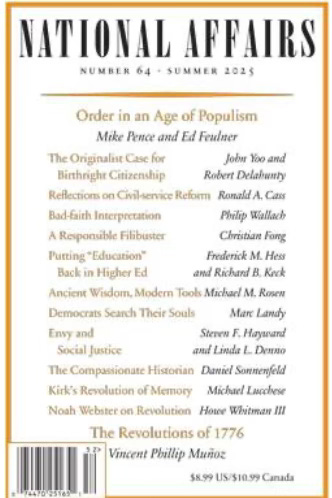Your Three Whisky Happy Hour hosts were busy this week, with a flood of publications coming out all at once.
Let’s start with National Affairs, the quarterly journal of the American Enterprise Institute. The new issue just out yesterday features John Yoo and his frequent writing partner Robert Delahunty offer up “An Originalist Case for Birthright Citizenship.” Now, John is completely wrong on this issue, and so readers looking for more sensible fare will want to take in the article in this same issue by me and “Lucretia” (here writing under her real name, but don’t tell anyone!), on “Envy and Social Justice.”
“Today, envy is the silent partner of radical egalitarianism, and is ubiquitously leveraged in the promotion of "social justice." Social scientists by and large are committed to such egalitarianism, and therefore either ignore envy as a significant social force or seek to cast it as morally defensible.”
A couple morsels of our wisdom:
The acceptance of envy, either active or implicit, is ultimately used to pursue an unachievable end: equity, or the complete equality of material conditions. The need to harness a destructive vice to obtain an impracticable end is no accident: Contravention of reality always requires corrupt means. To keep its corrosive tendencies at bay, Americans must learn to recognize envy for what it is and be wary of any political project that embraces it as a primary tool. . .
Commitment to, or dominant consensus around, an egalitarianism that defines equity as the predicate for punitive taxation and massive redistribution will necessarily avoid any subjects that might controvert this agenda. . .
There’s lots more in the full article, which I encourage curious readers to take in.
But wait! There’s more! “Lucretia” also turns up today at the Civitas Institute website, with an article entitled “Putting the Judicial Branch in Its Place.” Sample:
This rather skewed notion of judicial independence has become in modern parlance almost synonymous with the idea that only the judiciary can provide for constitutional checks and balances and ensure that individual rights are protected against government overreach. That such a role was never envisioned by the founders goes without saying; yet proponents of this vaunted idea of judicial power frequently rely on Marshall’s decision in Marbury to justify their position that the judiciary is the final—and in many cases the only—check on government. In the course of justifying the exercise of judicial review, i.e., the power to declare laws contrary to the Constitution null and void, Marshall asserts that “it is emphatically the province and duty of the judicial department to say what the law is.” However, so problematic was this assertion of power both at the time and for almost half a century after that, the Supreme Court did not again (until the infamous Dred Scott case) declare another law of Congress unconstitutional. Moreover, the nature of that power exercised in Marbury was of a quite limited character, dealing specifically with a provision of a law passed by Congress that attempted to add to the Supreme Court’s own powers. Marshall declared the law null and void, thereby refusing to exercise that power in a highly political and controversial case. In other words, the great Chief Justice Marshall’s only use of the power of judicial review to strike down an act of Congress was in a case dealing directly with the Supreme Court’s powers. This is a far cry from a single district court judge ordering the President of the United States to stop the deportation of a generalized class of criminal illegal aliens without (its skewed and faulty definition of) due process.
And this is on top of the piece she wrote for us about Juneteenth on Wednesday.
Not to be outdone, John Yoo and Robert Delahunty revisit the same question in National Review: “Trump Should Win His Court Battle with Newsom Over Riot Response.”
So we’re keeping busy. Except for me. I’m still on an extended romp overseas, this time pondering why is it people say the hardest part about getting around Ireland is driving on the left side of the road. What left side, I ask you?





hardest part about getting around Ireland is driving on the left side of the road. What left side, I ask you?
Where is that? The West?
Envy is the original leftist sin. The antidote is gratitude. Envy makes the leftist miserable and motivates them to make others miserable. It leads to resentment, which leads to violence. Jordan Peterson has commented, written, and taught extensively about this.